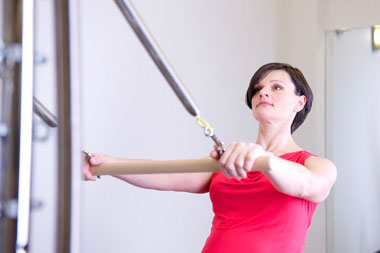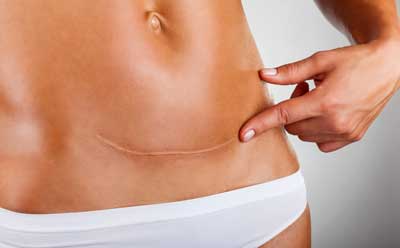Hysterectomy recovery time: Everything you need to know
This blog is reader-supported. When you buy through a link on our site, we earn a commission at no extra cost to you. Read more
Recovering from a hysterectomy can be a unique journey for each woman, influenced by factors such as age, general health, and the type of hysterectomy performed. The hysterectomy recovery time can vary, but it is essential to understand what to expect and how to take care of yourself during this period.

The length of your recovery can range from a few weeks to up to eight weeks, depending on the type of hysterectomy you had.
How to speed up your hysterectomy recovery? In this post, we will explain what you can expect regarding your recovery and how you can speed up (or slow down) your progress by doing certain things.
How quickly you bounce back can depend on which type of hysterectomy you have had.
Clearly, most women will benefit from knowing what is allowed and what is not. Here is some key information for an uncomplicated hysterectomy recovery.
Hysterectomy Recovery Time You Spent in Hospital
Can you go home the same day after a hysterectomy?
A hysterectomy’s hospital stay depends on the type of surgery and individual factors. While some women may be able to go home on the same day as the surgery, others may need to stay in the hospital for a few days. Your doctor will determine the appropriate discharge timing based on your condition.
If you have had a laparoscopic or vaginal hysterectomy, it is likely that you will only spend a day or two in the hospital. This is because there are only a few small incisions instead of one larger incision, like with abdominal surgery, allowing you to go home sooner.
For an abdominal hysterectomy, staying in the hospital for up to 5 days may be necessary. This may even be less if you are recovering well.
Hysterectomy recovery time is much faster with newer and safer types of non-invasive surgery. Like with a DualPort laparoscopy, you can sometimes go home on the same day.
Things that may delay the hospital stay are existing health issues like diabetes or blood disorders, your age, or when there are post-operative complications.
How long do you have to be on bed rest after a hysterectomy?

After undergoing a hysterectomy, bed rest depends on the type of surgery and individual circumstances. You’ll get specific instructions from your doctor. Your recovery depends on rest. It allows your body to heal and reduces the risk of post-operative complications and pain. Following your doctor’s advice and taking the necessary rest can ensure a smoother and faster recovery.
What happens if you don’t rest after a hysterectomy?
Failing to rest properly after a hysterectomy will hinder your healing process. If you disregard the recommended bed rest, you may experience increased pain and discomfort. Furthermore, without adequate rest, you may prolong your recovery time.
Rest is essential for allowing the surgical site to heal and for your body to adjust to the changes. Ignoring the need for rest increases the risk of complications, such as infection or bleeding. Your body will heal faster if you rest and follow your doctor’s instructions.
Vaginal Discharge or Bleeding during the hysterectomy recovery time
You can expect a bit of vaginal bleeding after your hysterectomy, but usually, this does not last longer than 6 weeks. It is likely to be similar to a very light menstrual period and tends to be either pink or brown in color. You will probably want to use sanitary pads while the discharge persists. Avoid the use of tampons as they increase the risk of infection.
Call your health care provider if you bleed as heavily as your menstrual period or you pass bright red clots. But also, if the discharge smells stronger, it could be a sign of infection.
Why does a hysterectomy hurt so much?
Pain after a hysterectomy is a normal part of the recovery process. The surgery involves the removal of organs and tissues, which can result in discomfort and soreness. Your body needs time to heal and adjust to the changes that have occurred.
Waking up after surgery, you may have some pain in your lower abdomen.
A hysterectomy can be painful, but there are ways to manage it. Your doctor can prescribe appropriate pain medication to help alleviate your discomfort. In addition, following post-operative instructions, like rest and avoiding strenuous activities, can contribute to less pain and a faster recovery.
Taking painkillers is more important for your recovery than you might think. The sooner you can move around freely without pain, the speedier your hysterectomy recovery time will be.
Read also: Essential Advice for Husbands After a Hysterectomy – Practical Tips For Emotional Support.
Common Post Hysterectomy Bladder and Bowel issues
Constipation is fairly common, especially in the first few days of your hysterectomy recovery. You may not have bowel movements for the first few days. This is quite normal because you are not moving around immediately after the surgery.
After surgery, pain medicine can cause constipation, which can be uncomfortable. Following these steps will help you relieve constipation:
- Ensure you drink enough water daily, at least 6 to 8 glasses.
- Consume fruits, vegetables, and whole grain bread that are high in fiber.
- Use a stool softener or mild laxative if necessary.
- Be careful not to strain as you poop, and refrain from using enemas.
Constipation is one of the reasons why you are advised to start walking and moving around as soon as possible, as it helps to activate your bowels. In the short term, you may be given laxatives to make bowel movements easier. They prevent you from straining and risk opening up your hysterectomy incision.
How do you get rid of trapped gas after hysterectomy?
You can prevent or treat gas by doing the following:
- Take a short walk every day, or walk a little farther.
- Try not to drink carbonated drinks. Warm drinks are best.
- Place your knees up to your chest while lying on your left side. If you prefer, get on your knees and lean forward, resting your weight on your folded arms while raising your buttocks.
Is it normal to have trouble peeing after a hysterectomy?
Some women may have difficulty urinating after surgery. You might be experiencing this because of your surgery. But it can also be a result of pain medication, discomfort, or anxiety. You may try the following:
- Make sure you do not strain or bear down when you go to the bathroom. In this case, you may damage the surgical site.
- Sometimes, it helps when you sit in warm water to urinate. Be careful not to wet your incision till it has healed.
- Don’t let your bladder fill up too much. Urinate more often to make it easier.
- Strengthen your muscles with Kegel exercises.
If you cannot urinate by yourself before leaving the hospital, a urinary catheter (a small tube that drains urine from a bladder) may be necessary.
Urinary incontinence can also occur after a hysterectomy. You can take some steps to help this by strengthening your pelvic floor muscles.
Recommended reading: Trouble sleeping after hysterectomy – 10 Tips for managing sleep issues.
Following a hysterectomy: how to care for yourself at home
After discharge from the hospital, you will continue your recovery at home, gradually regaining your strength and returning to your usual activities.
Eating and Drinking
To get back your strength and to help your body recover from the surgery, you will have to eat healthy, nutritious food. To prevent constipation, you will need plenty of fiber. You can find these in whole grain foods, fruits, and vegetables, especially leafy greens and citrus fruits.
You may want to read our guide on maintaining a healthy post-hysterectomy diet plan. It’s crucial you take good care of your body for a smooth recovery after surgery. Eating the right diet can optimize healing and reduce the risk of bowel problems.
While you are recovering, stock up on foods that promote healing. Vitamins A and C encourage wounds to heal, so they are a great choice while your incision is healing. Zinc is also good for this. Vitamin K is important for blood clotting after surgery.
Physical Activity after Hysterectomy
Resting as much as possible in the first couple of weeks can help your recovery. However, it is still a good idea to move around and start doing some gentle exercises, too. Once you feel able to do so, your doctor will usually recommend that you do some walking every day.
However, the distance you can walk will depend on your individual healing process and overall physical condition. Listening to your body as you gradually increase your activity level is important. Gradually increase distance after feeling comfortable with short walks.
When can you do stairs after a hysterectomy? Stairs can often be tackled from early on in your hysterectomy recovery. It’s best to avoid climbing stairs when it hurts, but when you can, go ahead and climb them. Take it slowly, one leg at a time, and take a break mid-climb if you feel tired.
Fatigue is an issue for a lot of women after a hysterectomy. Especially in the early days, it is important to avoid overdoing things. Feeling extremely fatigued? Here are some tips:
- Sleep at least eight hours a night. Take a nap during the day if you can.
- Consume healthy, well-balanced meals.
- Ask your family and friends for help to ensure you can get enough rest.
How Much Weight Can I Lift?
Be aware of lifting restrictions after a hysterectomy. Light lifting is generally okay if you do not try anything heavier than a kettle during the first week. To be on the safe side, don’t lift more than 3-4 kg for 4–6 weeks.
Heavy lifting can open up your hysterectomy incision or damage your vaginal cuff (inner wound). It may strain or damage the abdominal muscles before they have had a chance to heal properly. So heavy lifting isn’t recommended in the first 6 weeks of your recovery. Stretching is also best avoided for the first 4-6 weeks of your recovery.
Signs you are overdoing it after hysterectomy
Here are some potential signs that you may be overdoing it after a hysterectomy:
- Increased bleeding or spotting from the incision sites. Light bleeding or spotting is normal in the first few weeks, but heavier bleeding could indicate overexertion.
- Increase in pain or discomfort in the abdomen or pelvic area that is not relieved by pain medication. Pain levels should gradually decrease over time as you heal.
- Fatigue or lack of energy beyond what is expected for your recovery stage. Rest is important for healing.
- Your belly is swollen with redness or tenderness around the incision sites.
- General weakness or dizziness when standing or walking too long. Take things slowly.
Listen to your body, and don’t push yourself too hard too soon. Contact your doctor if you have any signs of overexertion or developing complications after surgery.
The normal recovery time for an abdominal hysterectomy can take 6-8 weeks. However, it is possible to recover from laparoscopic and vaginal hysterectomies in as little as two weeks. If you live alone, asking a family member or friend for help may allow you to take things easier.
The full hysterectomy recovery time can potentially take up to 12 weeks. Mind, most women feel that they have recovered around the 8-week mark.
Why am I so emotional after the hysterectomy?

In women of childbearing age, ovary removal triggers immediate menopause, which may result in intense emotions. The change in hormone levels due to sudden menopause can lead to crying spells, insomnia, mood swings, and irritability. To help you feel better if you are feeling very emotional or sad, here are some tips:
- Practice self-care. You can do relaxing things like reading, listening to music, and meditating. Taking care of your basic needs, like healthy eating and hygiene, can make you feel better.
- Keep a journal. Writing down your thoughts and feelings daily can help you process emotions and track your progress.
- Manage pain effectively. Work with your doctor to ensure any pain is well-controlled so it doesn’t add to stress or low mood.
- Accept your emotions. It’s normal to feel sadness, anxiety, or other emotions after surgery. Allow yourself to feel what you feel without judgment.
- Seek support if needed. Don’t hesitate to contact your doctor or a therapist if negative feelings persist or worsen over time. Support helps ensure a healthy recovery.
Further reading: Beat Depression after Hysterectomy: 5 Vital Tips To Manage These Emotions.
What to Wear During the Hysterectomy Recovery Time?
Wearing comfortable clothing is a smart move until your incision has fully healed. Anything that is too tight can be uncomfortable and potentially lengthen the time it takes for the incision to heal. You may also find it better to wear underwear that is a size larger than normal.
If you suffer from abdominal swelling, wearing your normal clothes can be very uncomfortable for the first few weeks. Try not to irritate the wound area with tight clothes. You can also look well in oversized tees, loose-fitting pants, jumpsuits, and t-shirt dresses.
Frequently Asked Questions about Hysterectomy Recovery Time
Doctors usually advise you not to fly until you fully recover and pain-free. During a fairly long flight, include staying well hydrated and doing leg exercises while seated.
Remember that airlines will often have their own guidelines and restrictions on flying after surgery. So, it’s worth checking before you book a flight. Major surgery like a hysterectomy may require your surgeon’s written permission.
Generally, you can return to work within 3-4 weeks, but it can be up to 8 weeks before you feel fully ready. You may need to be extra careful if you have a fairly physical role.
Remember that heavy lifting should not be performed for at least 6 weeks. However, sometimes, this can be difficult if your job requires much physical effort.
Women usually must wait 4 – 6 weeks for internal sutures to heal. After surgery, don’t engage in sexual activity until you’ve had a checkup. Ask your doctor when you are permitted to engage in sexual activity again. In some cases, this can take up to 6 to 12 weeks.
Most women can resume driving again within 2 to 6 weeks, but this can vary depending on the type of surgery and your doctor’s instructions. Because the laparoscopic hysterectomy recovery time is shorter, you can probably drive sooner than that. One thing to consider is whether you can wear a seatbelt comfortably and perform emergency stops. How fast you react in such a situation depends on whether you can move your lower limbs without causing pain. Additionally, many women need strong pain medications like opioids after a hysterectomy. These medications can have side effects, causing drowsiness and dizziness, negatively impacting your ability to drive safely. It’s also a good idea to check with your insurance provider. If anything happens, you don’t want to find yourself uninsured.
After a hysterectomy, the empty space left by the removal of the uterus is typically filled with the surrounding tissues and organs adjusting to the changes. Your body is remarkable in adapting to these changes, and over time, the area can be occupied by nearby tissues and organs. It’s important to remember that everyone’s healing process is unique and may take varying amounts of time.
Key Takeaways:
- The hysterectomy recovery time varies depending on factors like age, health, and the type of surgery.
- Immediately after the surgery, you will spend a few days in the hospital under medical supervision.
- Recovery at home can take up to eight weeks, depending on your individual circumstances.
- Follow your doctor’s advice, prioritize self-care, and listen to your body during recovery.
- Consult your doctor if you have any concerns or questions about your hysterectomy recovery.
Reviewed by: Kimberly Langdon M.D. (OB/GYN)
Date reviewed: 19/3/2019
Related reading
- How to prevent a vaginal cuff tear after hysterectomy
- The Undeniable Benefits of a Hysterectomy
- Hysterectomy Preparation Checklist
- Tips to Prevent Blood Clots after Hysterectomy That Can Save your Life
- Stressed About Hysterectomy Risks? What Every Woman Must Know







